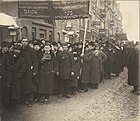In Zaltsikn Yam
| Part of a series on |
| Bundism |
|---|
 |
| 1890s to World War I |
|
| Interwar years and World War II |
| After 1945 |
|
| People |
| Press |
| Songs |
| Associated organisations |
| Splinter groups |
|
| Categories |
"In the Salty Sea",[a][b] known simply as "To the Bund",[c] is a Yiddish poem written by S. Ansky in 1901 and published in Der Arbeyter a year later.[1][2] It became a popular Yiddish song when music was added to it.[1] While it is unclear who composed the music to the song, the first published version was printed in 1919 by Yankev Glatshteyn in Warsaw, in the book Freiheits Lieder (Template:Lang-yi).[2] The poem and song is dedicated to the socialist General Jewish Labour Bund.[1][2]
The text has often been considered controversial, with its direct critiques of wealthy Jews (especially in Russia), Zionists, and the belief in Messiah.[2] Following The Holocaust, in 1945 the First, Second, Fifth, and Final stanzas were published in Mikhl Gelbart's yiddish song book Zingt mit mir and as such it has become convention to perform only these verses so as to omit criticism of other elements of the Jewish community.[2] Daniel Kahn however has recorded and performs the full version; such as for the Yoyvls of the Australian Bund (one of the times with Psoy Korolenko; who translated the verses into Russian).[3][4]
Recordings
Due to the song's aforementioned controversial nature, recordings are difficult to track down (including with several published versions of the manuscript having no known recordings).[2] However here are some of the few that exist:
- [Ethnographic recording], Lazar Vishniak singing in a Frankfurt POW camp, 1915 Recording (only first stanza, in timecode 12:40)
- [Ethnographic recording], Ruth Rubin, Preformed in New York, 1948 Recording
- "Once upon a time" (Amol Iz Geven A Mayse), compiled and narrated by Joseph Mlotek arr. Vladimir Heifetz sung by Sidor Belarsky and Masha Benya, 1957 Recording
- "In Love And In Struggle: The Musical Legacy Of The Jewish Labor Bund", featuring Zalmen Mlotek, Adrienne Cooper, Dan Rous with The New Yiddish Chorale and The Workmen's Circle Chorus, 1999 Recording
- "The Upward Flight: The Musical World of S. An-sky", Michael Alpert and Stuart Brotman, 2006 Recording
- "The Unternational: The First Unternational", featuring Daniel Kahn, Psoy Korolenko, and Oy Division, 2008 [The song is sung in both Yiddish and English][5] Recording
Lyrics
| Yiddish original[d] | Romanization of Yiddish | Translation by Daniel Kahn[6] |
|---|---|---|
אין זאַלציגען ים פון די מענשליכֿע טרעהרען |
In zaltsikn yam fun di mentshlekhe trern |
Beneath the salt sea of humanity's weeping |
Notes
- ^ Template:Lang-yi, pronounced [ɪn ˈzaɫtsɪkn̩ jam]
- ^ Also known in Yiddish as In Zaltsikn Yam Fun Di Mentshleche Trern (אין זאַלטציקן ים פֿון די מענשליכע טרערן; lit. 'In the Salty Sea of Human Tears'), Tsum Bund: In Zaltsikn Yam Fun Di Mentshleche Trern (צום בונד: אין זאַלטציקן ים פֿון די מענשליכע טרערן; lit. 'To the Bund: In the Salty…'
- ^ Template:Lang-yi
- ^ Written in its original 1901 spelling.
References
- ^ a b c "Belarsky Songs". Archived from the original on 2009-06-01. Retrieved 2009-10-27.
- ^ a b c d e f "In Zaltsikn Yam - A Yiddish Workers' Song | Jewish Music Research Centre". jewish-music.huji.ac.il. Retrieved 2023-08-17.
- ^ In Zaltsikn Yam - Bund 120 Yoyvl 2017, 5 November 2017, retrieved 2024-01-31
- ^ 'In Zaltsikn Yam' - Daniel Kahn // 123rd Bund Yoyvl, 14 December 2020, retrieved 2024-01-31
- ^ "In Zaltsikn Yam, by Daniel Kahn, Psoy Korolenko, Oy Division". Auris Media Records. Retrieved 2023-06-10.
- ^ HQ, Yiddishkayt (2015-05-01). "The Salt Sea of Humanity's Weeping". Yiddishkayt. Retrieved 2023-08-17.
